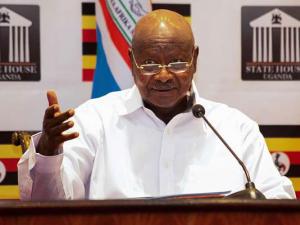
Museveni at pains to explain big 2018 misses
In his nine-point New Year’s address, President Yoweri Museveni explained what his government had achieved in 2018, but largely avoided addressing the domestic issues that raised eyebrows, and which remain a concern nationally, regionally and in international circles.
For an hour, the president focused on the economy, youth development and employment, crime, political discipline, regional integration, corruption, political leaders in wealth creation, irrigation and land evictions.
Politics, regional integration and corruption are key among issues that have given Uganda a bad image.
Domestically, President Museveni spoke about economic distortions.
Although the president was upbeat about Uganda’s economy, which is growing at the rate of 6.1 per cent, he appeared subdued about his project to deliver middle-income status by 2020.
In October, Finance Minister Matia Kasaija conceded that Uganda’s quest for lower middle income status — or per capita income of between $1,006 and $3,955 — would not be achieved owing to the country’s failure to complete key infrastructure projects, delayed oil and gas development, a growing population that does not match resources and a sluggish agricultural sector.
At per capita income of $666, Uganda is still playing catch up to its East African peers Kenya, Rwanda and Tanzania in the race to middle-income status.
Distortions in the economy
President Museveni reluctantly agreed with his Finance Minister on the infrastructure, but blamed other players for distortions in the economy, particularly electricity utility Umeme, arguing that Uganda’s economy would grow at a rate higher than six per cent in the financial year 2018/19 if the cost of electricity was not high by default.
He cited the cost of electricity generated by Bujagali hydro power dam which is US cents 13.38, without a subsidy, and after a waiver of corporate taxes, the tariff falls to US cents 10.5 per unit; and with debt refinancing, the cost reduces to US cents 8.5.
By contrast, electricity from the old power stations of Nalubaale and Kiira cost US cents 2, and once the delayed Karuma and Isimba hydropower projects come online later this year, their tariff will be US cents 4.97 and US cents 4.16 respectively.
“This is a distortion we are struggling to solve so that industrial power is at US cents 5,” President Museveni said. “I am told that Umeme is part of the distorters.
Umeme’s distribution costs account for 34 per cent of the total cost of power to the end user.
The president argued this compares badly with other economies in the region, with the transmission and distribution costs accounting for only eight per cent of the total cost in Ethiopia and in Kenya, 11 per cent.
“We are going to end all this distortion in the power sector, working with Kenya and Tanzania.” President Museveni said.
Graft
But the elephant in the room is corruption, which has seen Uganda’s image battered internationally, with Foreign Affairs Minister Sam Kutesa mentioned in a bribery scandal, for receiving $500,000 when he was President of the United Nations General Assembly.
The bribery scandal also mentions President Museveni as a beneficiary of another $500,000 from Patrick Ho, who was last year convicted by Manhattan US court for paying the bribes to Chad and Ugandan officials.
“Patrick Ho now stands convicted of scheming to pay millions in bribes to foreign leaders in Chad and Uganda, all as part of his efforts to corruptly secure unfair business advantages for a multibillion-dollar Chinese energy company,” Manhattan US Attorney Geoffrey S Berman said.
According to court documents, Mr Ho caused a $500,000 bribe to be paid, via wires transmitted through New York, to an account designated by Sam Kutesa, the Minister of Foreign Affairs of Uganda, who had recently completed his term as the President of the UN General Assembly.
Ho also schemed to pay a $500,000 cash bribe to Yoweri Museveni, the President of Uganda, and offered to provide both Kutesa and Museveni with additional corrupt benefits by “partnering” with them in future joint ventures in Uganda.
Unity of EAC
President Museveni’s leadership has also come under criticism as chairman of the East African Community, after the summit of the regional bloc flopped twice towards the end of 2018, as relations between Burundi and Rwanda deteriorated under his watch.
Yet in his New Year address, President Museveni skirted the tension in the region as a result of this issue, and told the nation that he is working to guarantee African integration and prosperity.
“When we produce goods and services, which big market will absorb them? The more people buy from us, the more prosperous our businesses become.
That is why the NRM insists on patriotism within Uganda, pan Africanism in Africa and international trade on the basis of comparative advantage globally,” he said.
He added that in 2019, he would work with Kenya, Tanzania, Rwanda, Burundi and South Sudan to consolidate the unity of EAC, and through Comesa and the African Union to build a wider continental market.
